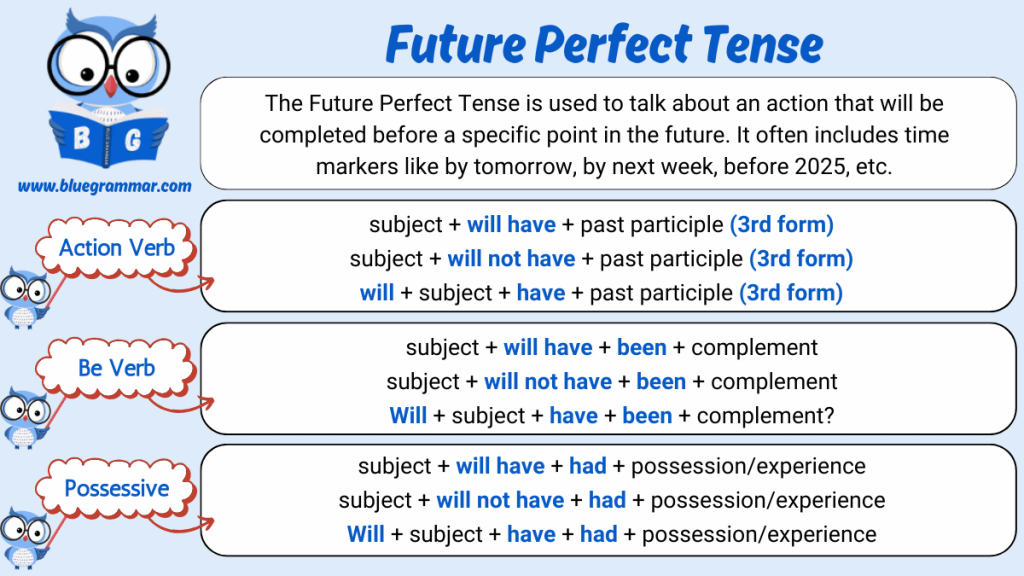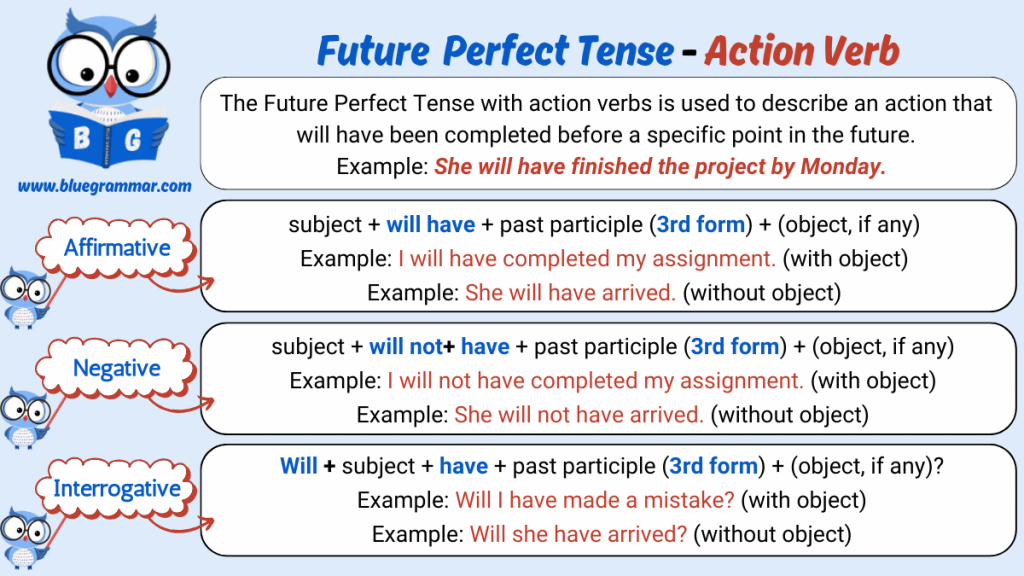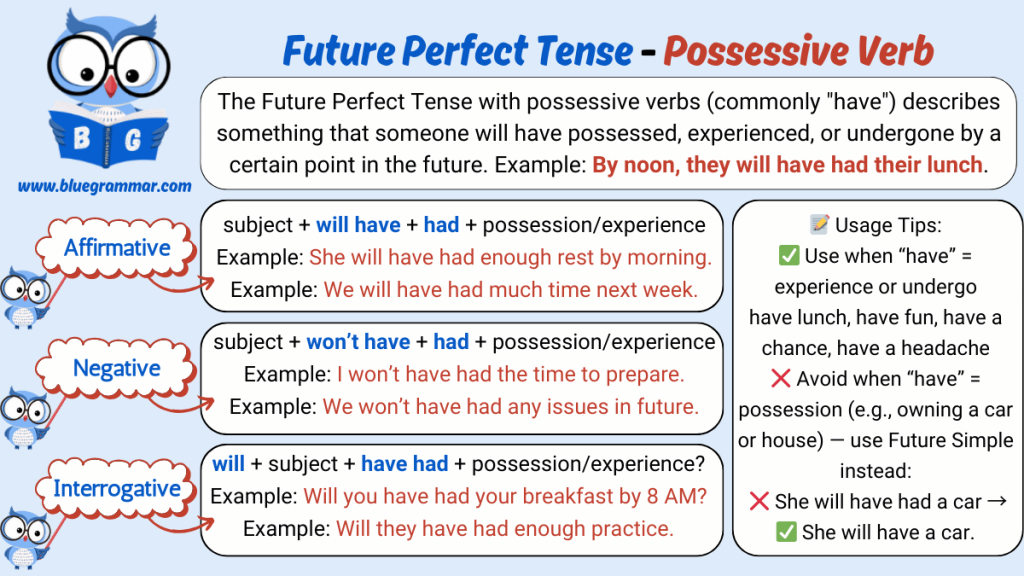
The Future Perfect Tense is used to describe actions that will be completed at a certain point in the future. It expresses the idea that something will have happened or been finished by a specific future time. This tense helps us talk about future actions that will have been completed before a given deadline.
Future Perfect Tense : Action Verb
Why We Use Action Verbs in Future Perfect
Action verbs are used in the Future Perfect Tense to describe actions that will be completed before a certain moment or event in the future. These verbs indicate an action that will be finished by a certain time. This tense is commonly used:
- To express actions that will be finished before a specific time in the future.
- To describe future expectations or predictions about completion.
- To highlight how long something will have been done by a certain time.
Time expressions often used with the Future Perfect include:
- By 9 PM tomorrow
- By the time I arrive
- By next week
- In five years

Structure for Positive Sentences
Subject + will have + past participle of the verb + object/time phrase (if any)
Examples:
- I will have finished the report by 5 PM.
- She will have completed her homework by tomorrow morning.
- They will have left by the time we arrive.
- We will have seen the movie by the end of the week.
- He will have traveled to five countries by next year.
- You will have learned the material by the end of the course.
- The children will have finished their playtime when we get home.
Structure for Negative Sentences
Subject + will not have (won’t have) + past participle + object/time
Examples:
- I won’t have finished my work by the deadline.
- She will not have written the letter by then.
- They won’t have arrived before the meeting starts.
- He won’t have saved enough money by next month.
- We will not have completed the project by Friday.
- You won’t have received the package by tomorrow.
Structure for Interrogative Sentences
Will + subject + have + past participle + object/time?
Examples:
- Will you have completed the assignment by 3 PM?
- Will she have written the report by the time we meet?
- Will they have left by the time we get there?
- Will we have finished the task by tomorrow?
- Will he have traveled to Paris by next summer?
- Will they have received their certificates by then?
Future Perfect Tense : Be Verb
Why We Use Be Verbs in Future Perfect Tense?
The verb “be” is used in the Future Perfect Tense to describe actions that will have been completed in the future. In this tense, we use “been” (the past participle of “be”) to describe states or conditions that will exist after an action is completed.

Structure for Positive Sentences
Subject + will have + been + adjective/noun
Examples:
- She will have been tired by the time she finishes the marathon
- He will have been a teacher for 10 years by next month.
- They will have been married for 20 years by the anniversary.
Structure for Negative Sentences
Subject + will not have (won’t have) + been + adjective/noun
Examples:
- She won’t have been feeling well by the end of the day.
- They will not have been in the office by the time you arrive.
- He won’t have been a part of the team for long.
Structure for Interrogative Sentences
Will + subject + have + been + adjective/noun?
Examples:
- Will she have been ready by the time you come?
- Will he have been present at the meeting?
- Will they have been in the office for a year by then?
Future Perfect Tense : Possessive Verb
Why We Use Possessive Verbs in Future Perfect Tense?
Possessive verbs like “have” are not typically used in the Future Perfect Tense to express permanent possession. However, when “have” is used to express temporary experiences or activities, it can be used in the Future Perfect Tense to indicate that someone will have experienced something by a future time.

Structure for Positive Sentences
Subject + will have + had + object/experience
Examples:
- I will have had lunch by the time you arrive.
- She will have had her meeting by 4 PM.
- They will have had a great time by the weekend.
- He will have had his coffee by then.
Structure for Negative Sentences
Subject + will not have (won’t have) + had + object/experience
Examples:
- I won’t have had the chance to meet her by next week.
- She will not have had the opportunity to travel by next year.
- They won’t have had enough time to finish the project.
Structure for Interrogative Sentences
Will + subject + have + had + object/experience?
Examples:
- Will you have had lunch by the time we meet?
- Will she have had her appointment by 2 PM?
- Will they have had a chance to review the document?
Important Notes:
Use the Future Perfect to describe actions that will be completed before a specific point in the future.
- Correct: I will have completed my work by 5 PM.
- Incorrect: I will complete my work by 5 PM. (This is Future Simple.)
Time expressions like “by the time,” “by next year,” and “in two days” add clarity to the Future Perfect.
Stative verbs (like “belong,” “know,” “seem”) are not used in continuous forms in the Future Perfect, as they describe conditions, not actions.
Future Perfect is often used to express the completion of an action before a specified future time, while Future Continuous focuses on actions happening at a certain time in the future.